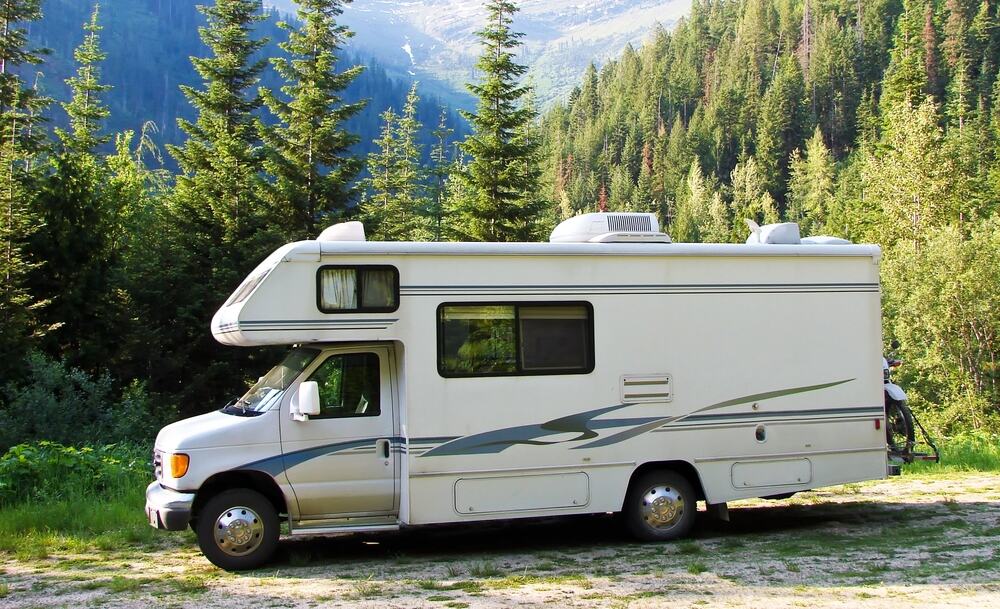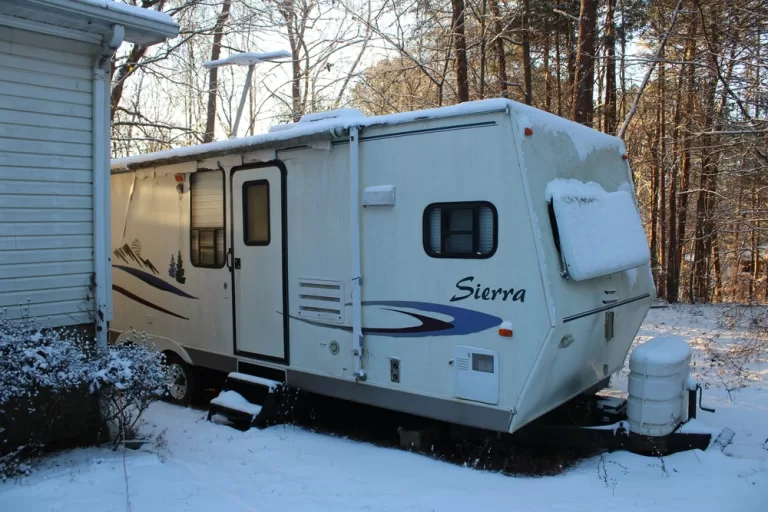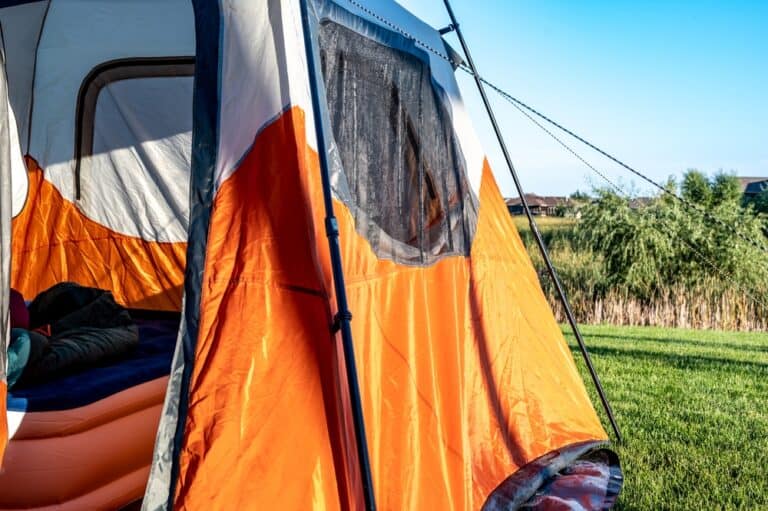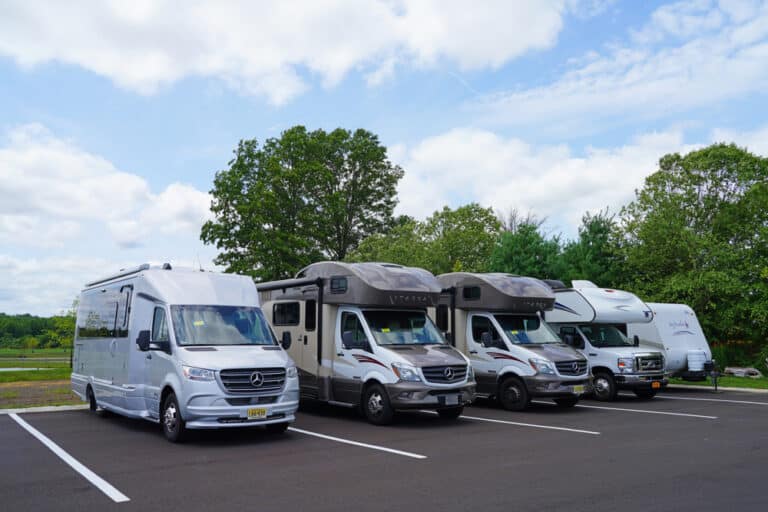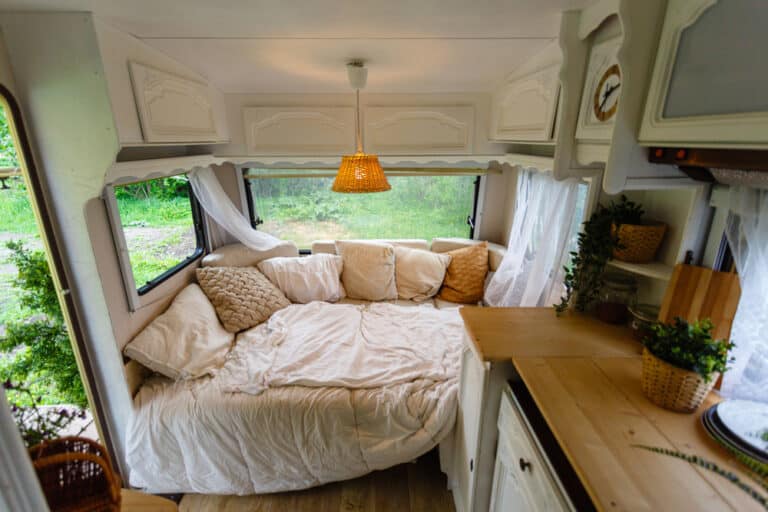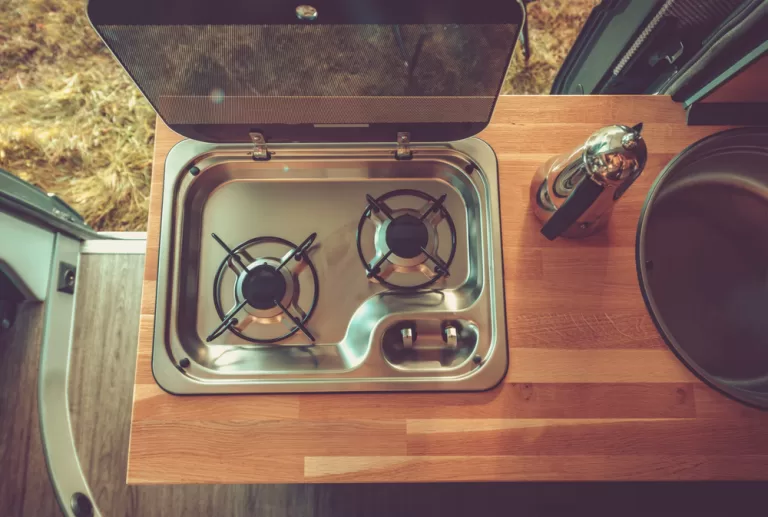What Does RV Stand For? (2023)
What does RV stand for? It’s a slang term for Recreational Vehicle, of course! But what does that mean? And where did the term come from? In this blog post, we’ll explore the history of RVs and what they are used for today. We’ll also take a look at some of the different types of RVs that are on the market and see what sets them apart. If you’re considering the RV lifestyle or just want to learn more about them, this is the blog post for you!
History of RVs
The first recreational vehicles were actually horse-drawn carriages that were used for camping. These early RVs were called “caravans” and were used by wealthy families in Europe who could afford to travel with all of their belongings. According to History Cooperative, Caravanning became popular in the United States in the late 1800’s, when covered wagons were used to cross the country. Families would load up their wagons with all of their possessions and food, and head west in search of a better life.
As the years went on, RVs became more and more popular. In the early 1900’s, automobiles were invented, and RVs began to be built on truck chassis. These early RVs were called “house cars” or “camping trailers.” In 1916, the first pop-up camper was invented, and in 1930, the first self-contained RV was built. (This RV had its own bathroom and kitchen!)
RVs really took off in the 1950’s, when they became more affordable for families. This was also the era when RV parks and campgrounds began to popping up all over the country. Today, there are more than 16 million RV owners in the United States!
Types of RVs
Today, RV’s come in all shapes and sizes, from small pop-up campers to large luxury motorhomes. They can be used for a variety of purposes, from camping and fishing trips to full-time living. RV’s have come a long way since their humble beginnings, and they continue to evolve as our needs and wants change. Here are some of the most common RVs.
- Travel Trailers
- Fifth Wheelers
- Class A, B, C Motorhomes
- Pop Up Campers
- Toy Haulers
Travel Trailers

- Travel trailers are a popular choice for those seeking a convenient and flexible way to explore the world. These towable recreational vehicles come in various sizes and designs, catering to different preferences and needs. One of the main advantages of travel trailers is their versatility. Whether you’re planning a weekend getaway or a cross-country adventure, a travel trailer allows you to bring the comforts of home along with you.
- Equipped with amenities such as kitchens, bathrooms, sleeping quarters, and entertainment systems, these trailers offer a comfortable living space on the go. They are also customizable, allowing owners to personalize their trailers to suit their specific requirements and aesthetic preferences.
- Another notable benefit of travel trailers is their mobility. Unlike motorhomes or RVs, travel trailers can be detached from the towing vehicle, giving you the freedom to explore and run errands without the need to bring your entire living space with you. This flexibility allows travelers to access more remote locations and maneuver more easily in tight spaces.
- Additionally, travel trailers are generally more affordable than motorized options, making them an attractive choice for individuals and families looking to embark on memorable adventures without breaking the bank. With their convenience, versatility, and affordability, travel trailers continue to be a popular choice for travel enthusiasts seeking the perfect balance between comfort and exploration.
Fifth Wheelers

- Fifth wheelers, also known as fifth wheel trailers or fifth wheel campers, offer a unique and spacious option for travel and camping enthusiasts. These trailers are designed to be towed by pickup trucks equipped with a specialized hitch, known as a fifth wheel hitch, which is mounted in the bed of the truck. The defining feature of fifth wheelers is their forward extension that extends over the bed of the truck, providing additional living space compared to conventional travel trailers. This extension typically houses the bedroom area, creating a separate and private sleeping quarters for travelers.
- The extra height and length of fifth wheelers also allow for higher ceilings and more storage space, making them an ideal choice for those seeking a comfortable and well-equipped home on wheels.
- One of the key advantages of fifth wheelers is their stability and maneuverability on the road. Due to the unique hitch design, fifth wheel trailers have a lower center of gravity compared to travel trailers, resulting in better stability and reduced sway while towing. This stability, combined with their shorter overall length compared to motorhomes, allows for easier maneuvering, especially in tight spaces or when backing up.
- Additionally, the spacious interiors of fifth wheelers often feature amenities such as full-sized kitchens, multiple bathrooms, and generous living areas, providing a luxurious and comfortable camping experience. With their unique design, stability, and spaciousness, fifth wheelers are a popular choice for long-term travelers and those looking to bring the comforts of home on their adventures.
Class A Motorhomes

- Class A motorhomes are the epitome of luxury and comfort on the road. These large, self-contained recreational vehicles are built on a specially designed chassis and resemble a bus or coach in appearance. Class A motorhomes offer an unparalleled level of living space and amenities, making them a popular choice for long-distance travel and full-time RV living. The interior of a Class A motorhome can resemble a small apartment, featuring a fully equipped kitchen, a spacious living area with comfortable seating, a bedroom with a queen or king-sized bed, and a bathroom with all the necessary facilities.
- Some Class A motorhomes even come with additional luxuries such as built-in entertainment systems, washer/dryer units, and slide-outs that expand the living space at the touch of a button. With their powerful engines and robust construction, Class A motorhomes provide a smooth and comfortable ride, making them ideal for extended road trips and cross-country adventures.
- Another advantage of Class A motorhomes is their versatility and ability to tow additional vehicles. Many Class A motorhomes are equipped with powerful engines that allow them to tow cars, SUVs, or even small boats behind them. This feature provides travelers with the flexibility to explore their destination without having to navigate the large motorhome through narrow streets or congested areas. It also allows for easier transportation to nearby attractions and makes it convenient to run errands or stock up on supplies.
- With their spacious interiors, luxurious amenities, and towing capabilities, Class A motorhomes offer a true home-away-from-home experience for those seeking the ultimate in comfort and convenience while traveling.
Class B Motorhomes

- Class B motorhomes, also known as camper vans or van conversions, offer a compact and versatile option for travel enthusiasts. Built on a standard van chassis, these motorhomes are smaller in size compared to their Class A and Class C counterparts, making them easier to maneuver and park. Despite their compact size, Class B motorhomes are ingeniously designed to maximize space efficiency. The interior typically features a small kitchenette, a cozy seating area that can convert into a bed, and a compact bathroom with a toilet and shower. Class B motorhomes are perfect for individuals or couples who prioritize mobility and simplicity while still enjoying the comforts of a fully functional living space.
- One of the major advantages of Class B motorhomes is their versatility and practicality. Due to their compact size, these motorhomes can navigate narrow roads and fit into regular parking spaces, allowing travelers to explore urban areas and reach remote destinations with ease. Additionally, Class B motorhomes are fuel-efficient compared to larger motorhomes, making them a more economical choice for those conscious of their budget and environmental impact.
- Their smaller footprint also grants access to camping sites and national parks that may have restrictions on larger vehicles. Class B motorhomes offer a convenient and nimble solution for individuals and couples who desire the freedom to travel on a whim and embrace a minimalist lifestyle on the road.
Class C Motorhomes

- Class C motorhomes are a popular choice for individuals and families seeking a balance between comfort and maneuverability. These motorhomes are built on a truck chassis with a distinctive cab-over design, featuring a sleeping area or an additional storage space above the driver’s compartment. Class C motorhomes offer a spacious interior with various floor plans available to accommodate different needs and preferences.
- They typically include amenities such as a fully equipped kitchen, a bathroom with shower, a dining area, and a separate bedroom. The sleeping area above the cab provides additional sleeping space or can be utilized as extra storage, making Class C motorhomes a practical option for larger groups or those who require more living and sleeping space on their travels.
- One of the notable advantages of Class C motorhomes is their ease of handling and drivability. The truck chassis and design provide a stable and comfortable driving experience, while the size and maneuverability of Class C motorhomes make them more suitable for navigating narrow roads and parking in compact spaces compared to larger Class A motorhomes.
- Additionally, Class C motorhomes often offer towing capabilities, allowing travelers to bring along additional vehicles or recreational equipment. With their spacious interiors, versatility, and user-friendly driving experience, Class C motorhomes provide a practical and comfortable solution for individuals and families who seek a reliable and enjoyable RV adventure.
Pop Up Campers

- Pop-up campers, also known as tent trailers or folding campers, offer a unique and versatile camping experience. These lightweight and compact trailers are designed to fold down for easy towing and storage, then expand into a fully functional living space when set up at the campsite. Pop-up campers typically feature a soft-sided canvas tent material that encloses the living area, providing a cozy and close-to-nature camping experience. When expanded, they offer sleeping areas, a small kitchenette, and sometimes a dining area. Some models may also include amenities such as a small bathroom or shower. The ability to collapse and expand makes pop-up campers an excellent choice for campers who value flexibility, easy towing, and a closer connection to the outdoors.
- One of the significant advantages of pop-up campers is their lightweight construction, which makes them towable by a wide range of vehicles, including smaller cars and SUVs. Their compact size and low profile while towing make them more aerodynamic and fuel-efficient compared to larger RVs. Pop-up campers are also easier to store, requiring less space than other types of campers when not in use. Additionally, the cost of pop-up campers tends to be more affordable compared to larger RVs, making them a budget-friendly option for camping enthusiasts.
- With their portability, affordability, and ability to provide a comfortable camping experience, pop-up campers are a popular choice for individuals and families who enjoy the flexibility of tent camping combined with the added convenience of a camper.
Toy Haulers
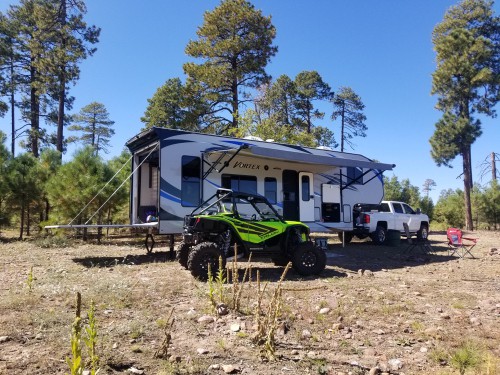
- Toy haulers are a unique type of RV specifically designed to accommodate both living space and storage for outdoor recreational vehicles, such as ATVs, motorcycles, bicycles, or even small boats. These versatile trailers feature a rear garage area with a ramp or large door that allows easy access for loading and unloading the toys. The garage area can be converted into a living space when the toys are removed, making it a flexible and multi-purpose area.
- Toy haulers often have a separate living area with a kitchen, bathroom, sleeping quarters, and seating areas, providing all the comforts of a traditional RV. This combination of living space and storage makes toy haulers a popular choice for adventure enthusiasts who want to bring their favorite recreational vehicles along while still enjoying the comforts of home on their travels.
- One of the key advantages of toy haulers is their ability to cater to active lifestyles and outdoor hobbies. Whether you’re an off-road enthusiast, a motorcycle rider, or a water sports lover, toy haulers provide a convenient way to transport and store your gear. You can easily bring your toys to various destinations and have the flexibility to explore different outdoor activities.
- Toy haulers also offer the advantage of customization, allowing owners to configure the garage area to fit their specific needs, whether it’s additional sleeping space, a workspace, or a mobile workshop. With their practicality, versatility, and ability to combine living space with storage for outdoor recreational vehicles, toy haulers are a popular choice for those seeking adventure and the freedom to bring their toys along on their RV journeys.
Conclusion

There are many reasons why people love the RV lifestyle. Have you ever been RVing? What did you think of it? For some, it’s the unique opportunity to travel and explore new places. For others, it’s the sense of community that comes from being a part of the RVing community. And for others still, it’s the ability to live a simpler life and enjoy the outdoors. Whatever the reason, there’s no doubt that RVing is a popular way to travel and live.
Looking for some helpful RV product guides? Check out my other blog posts.

